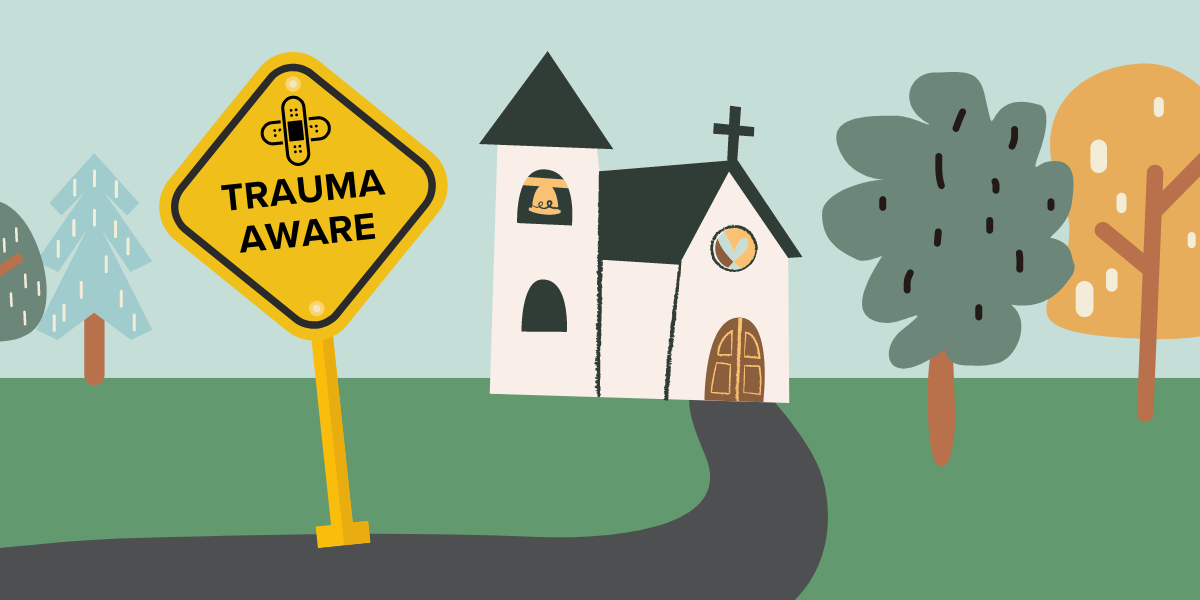There are situations that threaten our lives and existence, both physically and emotionally. A car accident, a bushfire or flood, being abused, a traumatic birth, living in a war zone; these and anything else that leaves us fearful, helpless or in danger, are known as traumatic experiences. Most of us will face at least one such experience in our life. And many of us are exposed to the traumatic experiences of others in a way that can be traumatic for us. (This is known as secondary or vicarious trauma.)
Our bodies and minds react to such circumstances. Our stress response kicks-in and we can feel overwhelmed and distressed. Yet most of the time, that response is temporary, and even if life may never be quite the same again, before too long we can function and are able to return to our day-to-day responsibilities.
For some, however, recovery takes much longer. Normal coping mechanisms become overwhelmed and there is ongoing psychological and emotional impact. A person can be left feeling numb and ‘spaced out.’ They can experience flashbacks and unwanted thoughts and find it hard to think clearly. They may feel constantly hyped-up and irritable and have difficulty sleeping. And they may avoid people and places associated with the traumatic event as a means of trying to cope.
‘Trauma’ is the term used to describe this ‘wound to the mind,’ characterised by these and other enduring symptoms. Post-traumatic stress disorder (PTSD) is the clinical term to describe a serious lasting cluster of effects of trauma.
Trauma can be so all-encompassing that it shapes and defines life. The past, the present, and the future are all viewed through the lens of trauma and have a significant bearing upon everyday life and relationships. It can distort one’s view of self and others. Fortunately, there are treatments that enable many to recover well. Encouraging someone you know who is experiencing the effects of trauma to seek such professional assistance is a vital way to express your care.
When someone experiences a physical trauma, such as a serious injury, the impact is obvious for all to see. Psychological trauma may be more hidden. Perhaps unbeknown to us, there are many in our churches who live with the consequences of ongoing trauma. This might influence the way they relate to others or the way they respond in certain circumstances. But if such reactions have a negative edge, these are often interpreted as character flaws or poor behaviour, without any awareness that they might be manifestations of trauma.
As God’s people, we want to reflect his heart of compassion and love in our dealings with everyone. What might a compassionate and caring response to those experiencing trauma look like? Here are five suggestions that may assist in beginning that process.
1. Be aware of the impact of trauma
Think of a situation where you’re feeling on-edge or unsafe. Perhaps it’s a difficult conversation with a work colleague. Or walking at night through a poorly lit and unfamiliar neighbourhood. Now, does a situation like this bring out the best in you? Probably not. We don’t relate in a warm, relaxed, easy-going manner when we’re not feeling comfortable.
Those experiencing trauma will often not naturally feel safe. They may come to church alert and vigilant, ever aware that something or someone might trigger a strong physical or emotional reaction.
Ministry staff and congregation members might not understand why survivors of trauma think, behave, or relate in certain ways. They may not be aware of the psychological damage that has occurred and the impact that has on the various aspects of a person’s life. Unfortunately, such lack of understanding can result in some who are experiencing trauma being labelled as difficult or unfriendly.
Those who work in the trauma field have language to assist in reframing our understanding. They suggest a mindset that asks what might have happened to someone, rather than focusing upon what is ‘wrong’ with them. This will guard against offering simplistic solutions or calling people out in a manner that may cause further harm.
To summarise, a good place to start when seeking to get to know and understand someone at church is to ask yourself the question, ‘What might have happened to them?’
2. Be a place of felt safety
Those who are experiencing trauma scan their environment to see if it is safe. As we seek to care, anything we can do to provide a sense of safety is of immense value.
Often when we talk about safety, we have the physical environment in mind. But when it comes to trauma, even more significant is psychological safety, which is very much tied to the way we relate with each other.
Well-functioning relationships are vital to human wellbeing. Warm and nurturing interactions feed our emotional health and can help us heal. But conversely, negative interactions can be psychologically damaging. So, a caring church that seeks to provide trauma-informed responses will take this into account.
Bessel van der Kolk, a psychiatrist with a wealth of experience working with trauma, describes what is needed:
Being able to feel safe with other people is probably the single most important aspect of mental health; safe connections are fundamental to meaningful and satisfying lives … social support is the most powerful protection against becoming overwhelmed by stress and trauma.
Social support is not the same as merely being in the presence of others. The critical issue is reciprocity: being truly heard and seen by the people around us, feeling that we are held in someone else’s mind and heart. For our physiology to calm down, heal, and grow we need a visceral feeling of safety.[1]
Being a safe person
If we want to provide a sense of safety to others, it’s important to remember that what feels safe to us, may not feel safe to another. We need to be cautious about our own assumptions and leave time to attune to what might be going on for them.
It can be helpful to reflect upon how we come across to others. Our demeanour; the way we speak; the dynamics of power and control we convey; the sorts of expectations we communicate – these all send a message. And those who have experienced trauma will be alert to these messages and they shape how safe they feel.
So, think, how might I respond to this person with compassion? It helps to be a calm presence and to be willing to sit with someone in their pain. Sometimes we remain silent. If they do want to talk, be curious about their story. But don’t put any pressure on them to share more than they feel comfortable with. Be kind and treat them with dignity, not condescension. Who knows what state we would be in if we had experienced what they have.
Safety in the culture and practices of the church
Some aspects of a church life can assist those experiencing trauma, while others hinder that sense of safety. For example:
- Does the physical layout of the building make for an easy exit for those who need to get away quickly?
- Is it communicated that there are women (either ministry staff or lay leaders) who are available to speak to women in the church in need of support or assistance?
- Recognising how critical bodily safety is for many, does the church respect personal boundaries, not presuming to hug or touch unless it is known that such behaviour is welcomed?
- Are people pressured to serve in a way that engenders guilt for those who lack the capacity to do so?
- Are those involved in teaching roles aware that guilt is a common consequence of trauma, and therefore tread carefully when speaking of matters to do with judgment to avoid re-traumatisation?
Being aware of factors such as these can assist in creating a more trauma-informed church.
To summarise, being a place of safety involves, (1) being a safe person yourself, and (2) having a church culture that promotes felt safety.
3. Don’t equate the experience of trauma with lack of faith or obedience
Trauma profoundly impacts a believer’s spiritual life and behaviour. It’s very difficult to maintain a calm and gracious presence when in a state of heightened vigilance and your mind is screaming, ‘Am I safe here?’ Some of the virtues of Christian living we delight to see in mature believers may be beyond the capacity of those experiencing trauma. Note how these writers describe how trauma impairs our ability to display the fruit of the Spirit:
… trauma can blight spiritual fruit; this can be still another source of shame. The autonomic defences … as well as powerful unprocessed posttraumatic emotions, compromise a capacity for self-control. Gentleness and kindness presuppose an awareness of others that is often beyond the reach of someone overwhelmed by the active volcanoes marking the posttraumatic inner life. Faithfulness assumes a capacity for consistency. The irritability that is a hallmark of trauma militates against patience. Lack of any sense of safety makes life as peaceful as walking on thin ice. The bloom of joy, which has roots in hope, withers when hope is uprooted like a tree (Job 19:10). Love formed in the traumatized person is often narcissistic, like that of a child, because emotions have not been processed with higher levels of emotional reasoning and the inexorable consciousness of acute pain turns awareness inward. All of this breeds discouragement and shame when the traumatized encounters Paul’s description of life in the Spirit.[2]
This is not to say that trauma implies spiritual immaturity. We need to recognise the (often immense) effort and maturity involved in persevering in trust in Christ in such circumstances. There may be occasions when certain behaviours need challenging. But let’s make our default response one of forbearance and compassion.
If those experiencing trauma find it difficult to attend church, remember that there could be good reasons for that. Offer encouragement that being separated from the body of believers doesn’t mean they are separated from God.
4. Allow them to tell their story if they want to
Naming a trauma can help disarm its power. You may have heard the phrase, ‘you cannot heal what you have not named,’ words that capture the truth that giving voice to difficult experiences can aid recovery.
Caution is required here. In the immediate aftermath of a traumatic incident, going over the details is not recommended, as this can embed traumatic memories more strongly. What helps at this stage is access to supportive relationships and ensuring that essential physical needs are met.
But down the track, some find real benefit in being able to share their story. Often this will take place with a counsellor or therapist. Sometimes, however, there is a desire to speak in the context of a supportive pastoral relationship. And for the Christian believer, this can help them process their trauma and integrate their experience into their faith. It can grow their understanding of how God might be trusted despite what they have endured.
What is needed is careful listening and patience. We listen and bear witness to their trauma. They may struggle to find words, so we remain patient and allow pauses. We say very little ourselves.
Because trauma always involves loss of one form or another, they also need to grieve. Allowing them to talk about their experience can assist this grief process.
5. Allow the gospel of grace to speak into trauma
Knowing Jesus Christ makes a profound difference to anyone’s life. But that doesn’t mean that the Christian gospel provides a quick fix for those experiencing trauma. While there is real hope and confidence that flows from resurrection faith, pain and distress linger on.
We need to acknowledge both these realities. We need a ‘double witness’[3] – a witness to the evil of trauma and its consequences and a witness to the hope of the gospel that speaks into this context. In so doing, we recognise the horror of trauma, where suffering continues to cast its shadow, while still giving voice to the life and healing that flow from God’s presence and care. Neither the evil nor the hope are downplayed or ignored.
We find such a response in the Bible in the practice of lament. In lament, the heartache of evil and suffering are brought with honesty to God. This is an act of faith that acknowledges he is the sovereign Lord and that he can bring change. Doubts can be expressed, and God’s promises can be wrestled with. And in so doing, renewed strength and hope may emerge.
Pastoral theologian, Deborah van Deusen Hunsinger, says:
We facilitate healing when we help the afflicted cry out their sorrow, rage, and tears to God. Prayers of lament – crying out to God for deliverance – seem to be faith’s only alternative to despair. Instead of protecting themselves against the pain, the afflicted are encouraged to go down into it, clinging to God’s promises as they do so.[4]
As we consider how the gospel of grace speaks into the context of trauma, a final matter is worth bearing in mind. Because Jesus is Lord, ongoing repentance is central to Christian living. But the Christian life is not a list of ‘shoulds’ and ‘oughts.’ The Christian gospel is not ‘try harder’ and ‘do more.’ No. At the heart of Christian experience is resting in the grace of God that is ours in Jesus Christ.
This is the message that those experiencing trauma most need to hear. That despite the struggles, the heartache, the pain, the grief, the perceived failings in loving God and loving others – they are precious to God and deeply loved by him. They need the balm of knowing that God will never leave or forsake them (Heb 13:5); that ‘the Lord is close to the brokenhearted and saves those who are crushed in spirit’ (Ps 34:18).
When these truths are affirmed and lived out in our churches, they will be places that care for those who have experienced trauma.
Further resources & reading
Phoenix Australia – https://www.phoenixaustralia.org
Blue Knot Foundation – https://blueknot.org.au
Joshua Cockayne, Scott Harrower & Preston Hill, Dawn of Sunday: The Trinity and Trauma-Safe Churches, 2022.
Judith Herman, Trauma & Recovery: The Aftermath of Violence—From Domestic Abuse to Political Terror, rev. ed. 2015.
Deborah van Deusen Hunsinger, Bearing the Unbearable: Trauma, Gospel, and Pastoral Care, 2015.
Bessel van der Kolk, The Body Keeps the Score: Brain, Mind, and Body in the Transformation of Trauma, 2014.
Susan Williams & Stephen Williams, How Can We Help Victims of Trauma and Abuse? 2021.
[1] Bessel van der Kolk, The Body Keeps the Score, 79.
[2] Susan L. Williams & Stephen N. Williams, How Can We Help Victims of Trauma and Abuse?, 54-5.
[3] Joshua Cockayne, Scott Harrower & Preston Hill, Dawn of Sunday: The Trinity and Trauma-Safe Churches, 154.
[4] Deborah van Deusen Hunsinger, Bearing the Unbearable: Trauma, Gospel, and Pastoral Care, 17.




